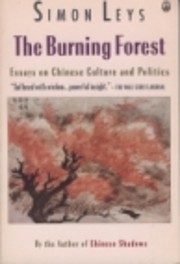

Fai clic su di un'immagine per andare a Google Ricerca Libri.
|
Sto caricando le informazioni... The Burning Forest: Essays on Chinese Culture and Politicsdi Simon Leys
 Nessuno Sto caricando le informazioni...
Iscriviti per consentire a LibraryThing di scoprire se ti piacerà questo libro. Attualmente non vi sono conversazioni su questo libro. nessuna recensione | aggiungi una recensione
Non sono state trovate descrizioni di biblioteche |
Discussioni correntiNessunoCopertine popolari
 Google Books — Sto caricando le informazioni... Google Books — Sto caricando le informazioni...VotoMedia: (3.31) (3.31)
Sei tu?Diventa un autore di LibraryThing. |
|||||||||||||||||||||||||||||||||||||||||||||||||||||||||||||||||||||||||||||||||||||||||||||||||||||||
While the ulterior motive of the Cultural Revolution may have been a power struggle, there are also theorists, such as MacFarquhar & Schoenhals, who suggest that the cultural destruction, effected by the Cultural revolution, did also have a positive effect by removing cultural traditions which had become shackles, and ultimately break down cultural capital that may have created a sense of class differences in the minds of the Chinese people. In that sense, we should not only focus on the destruction of material culture, but also the destruction of immaterial culture such as the pride of the intelligentsia, ancestor veneration and various other immaterial forms of cultural differences.
True to the spirit of revolution, "high culture" was replaced by "low culture", and while the appreciation of Chinese folk art and primitivism has its parallels in Western art of the same period, the destruction of "upper class" cultural capital was particularly resented by representatives of that class who had evaded or escaped the Chinese Revolution.
Simon Leys was particularly active publishing about Chinese culture and politics during the two decades from the 1970s through 1990s. His later work, while still referring to Chinese culture, is more diversified, including literary criticism closer to home.
Leys critical work about China almost always consists of a toxic mixture of superb literary criticism of some (obscure) Chinese poet or cultural phenomenon, interspersed with essays about "Human rights in China" or other politically motivated essays. Thus, The burning forest. Essays on Chinese culture and politics contains wonderful essays on Chinese Classical Aesthetics, Matteo Ricci, Père Huc and Lu Xun, to represent the former, alongside essays about Human rights in China, the death of Lin Biao, the politics of Zhou Enlai and Mao Zedong, and a section devoted to criticizing the so-called "fellow-travelers", in the form of an essay about Han Suyin and the so-called China experts.
Simon Leys is a persona non grata in the People's Republic of China, as in Chinese eyes he is against China. His criticism is too offensive. However, as I argued elsewhere, in his heart, Simon Leys is FOR China, perhaps not exactly this stage of China's history, but surely its cultural heritage of more than five thousand years, which Leys merely hopes to kindle. (